Are you curious if drinking coffee while fasting will ruin your progress? Black coffee, with fewer than 5 calories per cup, usually won’t break your fasting state. This post gives clear benefits, useful tips, and advice about which coffees are good or bad during intermittent fasting.
Keep reading to sip smarter and boost your results.
Key Takeaways
Black coffee is safe during fasting—it has under 5 calories per cup, won’t spike insulin, and won’t disrupt your fast.
Skip cream, sugar, or flavored syrups; they spike blood sugar, raise insulin levels, and interrupt fasting benefits.
Coffee can quiet hunger pangs by controlling hormones related to appetite, helping you stay comfortable longer.
Enjoying coffee during your fast boosts fat-burning, sharpens mental clarity, and supports a healthy metabolism.
Stick to coffee in the morning only—drinking it later in the day can disturb sleep and increase stress hormone levels.
Table of Contents
Can You Drink Coffee While Fasting?
Yes, coffee is fine during fasting. Black coffee has under 5 calories per cup and barely affects insulin. That’s great news for guys who follow intermittent fasting but still want that morning caffeine kick.
Personally, sipping plain black coffee made from fresh coffee beans helps control my hunger and keeps me sharp at the office.
Coffee is a gift of energy when your stomach is empty but your day is full.
What you put in your coffee really counts. Sugar, cream, or flavored syrups raise your blood sugar and insulin, breaking your fast. Some men prefer adding grass-fed butter or MCT oil for an energy boost, without seriously compromising fasting benefits.
Low-calorie flavorings like cinnamon or stevia let you enjoy better taste without getting off track. Timing matters too—coffee later in the day can mess up your sleep rhythm. Let’s take a closer look to see if other coffee types affect your fast.
Does Coffee Break a Fast?
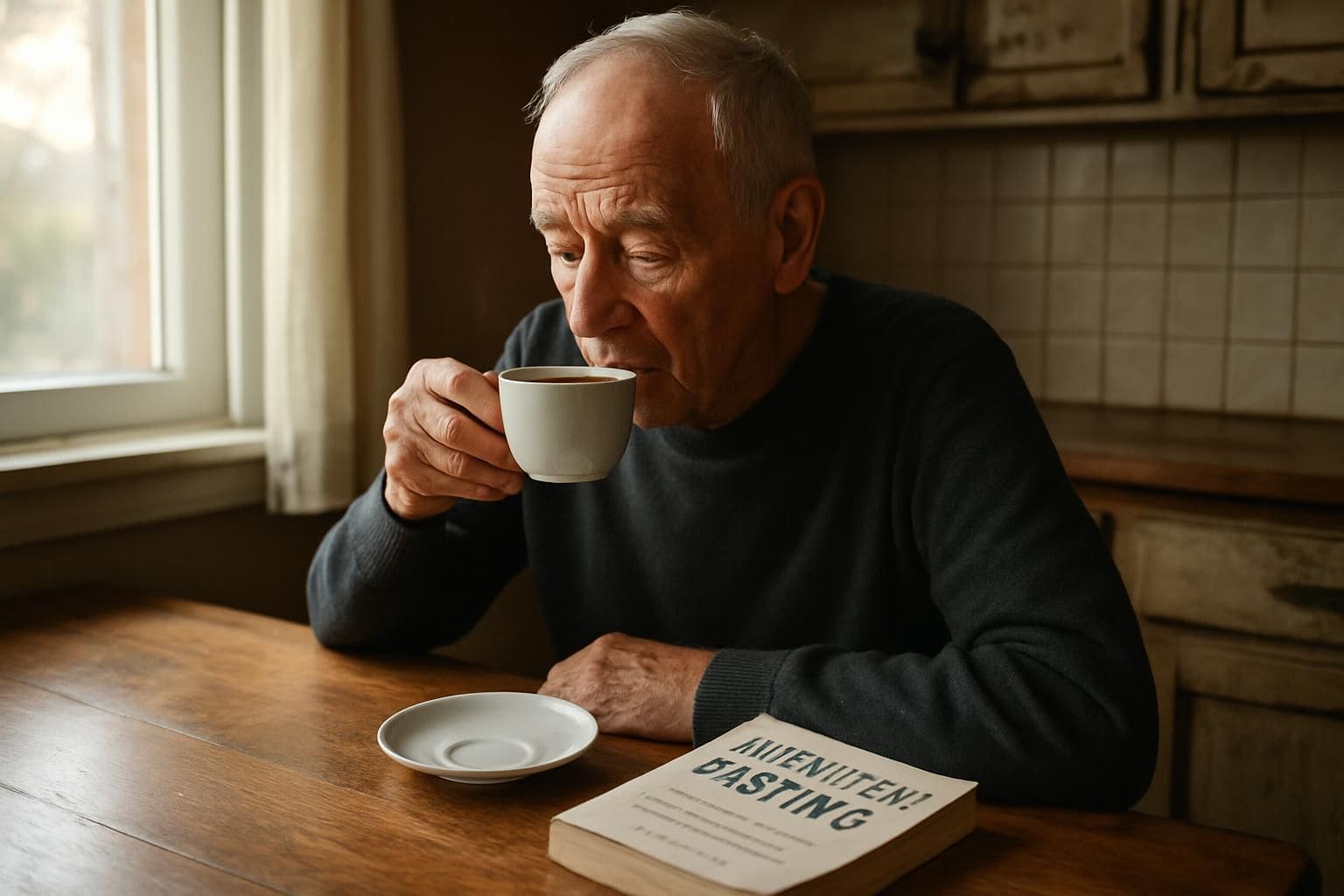
The answer to whether coffee breaks a fast depends on what you add to your cup. Plain black coffee has almost zero calories and won’t spike insulin levels, making it a safe choice during fasting periods.
Black Coffee
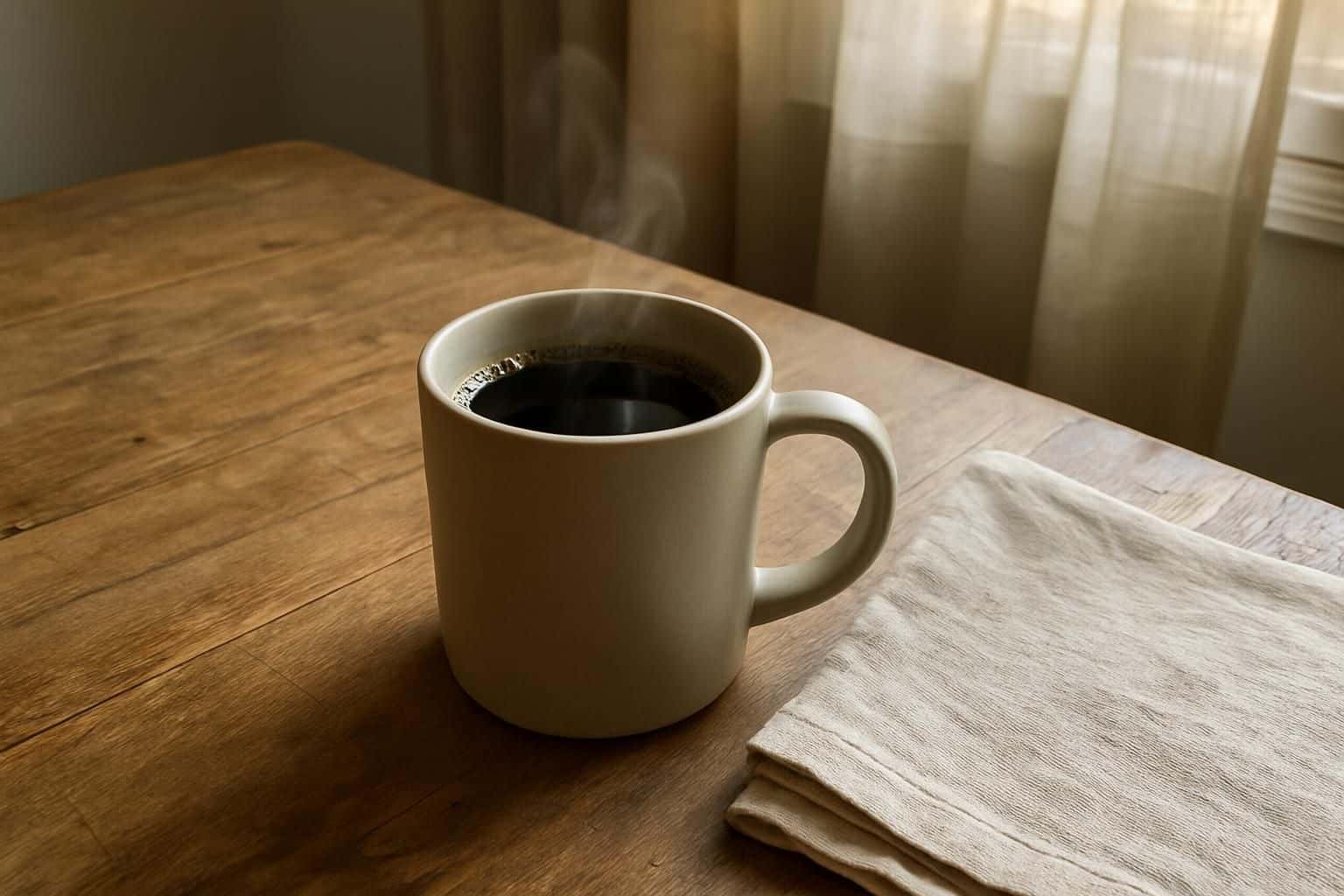
Black coffee can become your closest ally during fasting. Each cup contains less than 5 calories, so it won’t break your fast or cause an insulin spike. I drink a cup every morning during my fasting hours, and it helps curb hunger surprisingly well.
Plus, black coffee’s caffeine speeds up your metabolism, enhancing fat burning—a great bonus for guys aiming to trim belly fat.
Many guys also notice sharper mental focus after drinking black coffee while fasting. This natural stimulant keeps your mind alert without adding calories, allowing your body to maintain autophagy—your cells’ way of repairing themselves.
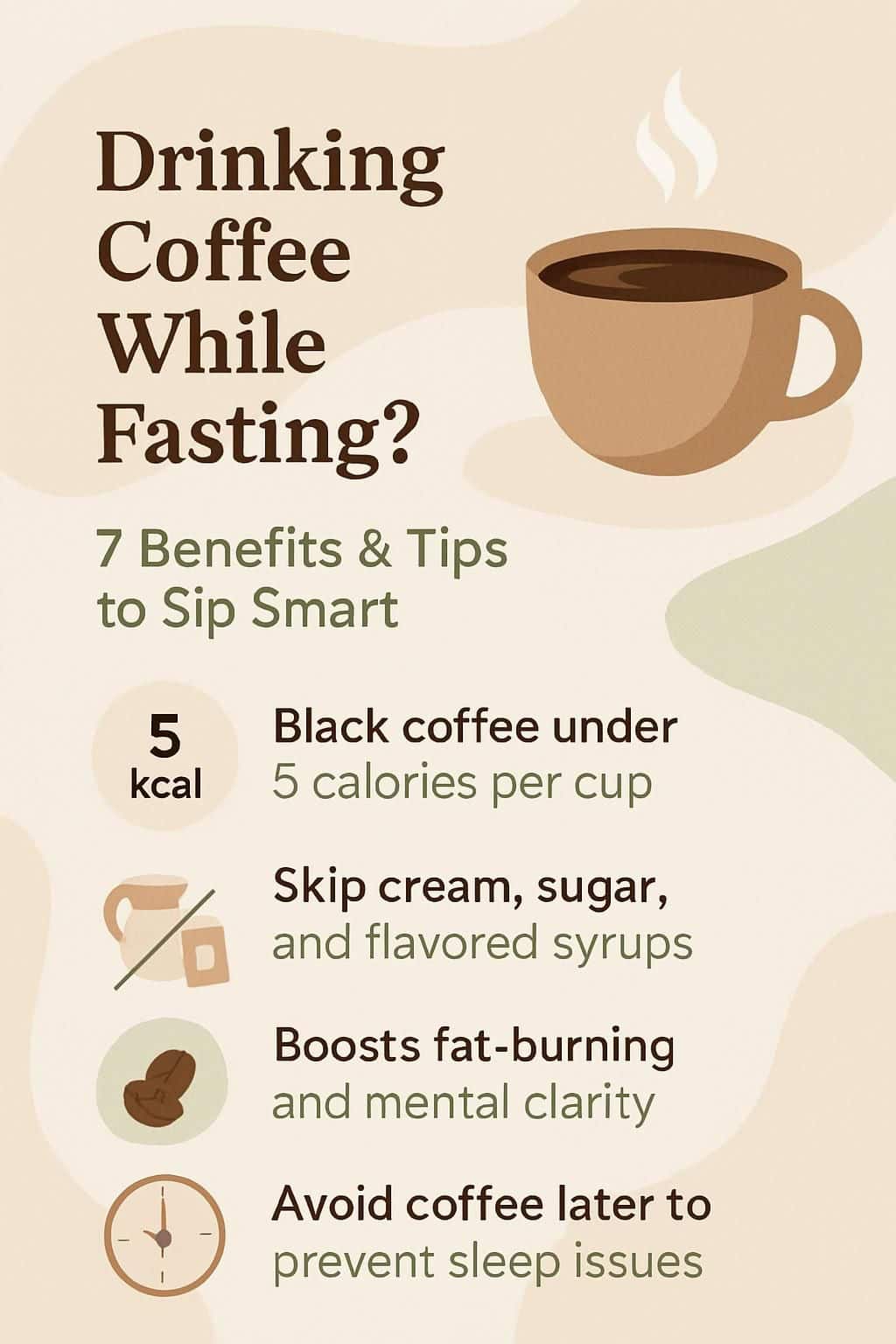
Still, be cautious about drinking coffee instead of water; I always keep my water close by to stay refreshed and hydrated. If regular coffee gives you jitters, switch to decaf or reduce the number of cups per day.
That way, you still meet your fasting goals while enjoying the rich flavor of pure coffee, free from milk, sugar, or extras that could interrupt your progress.
Flavored Coffee
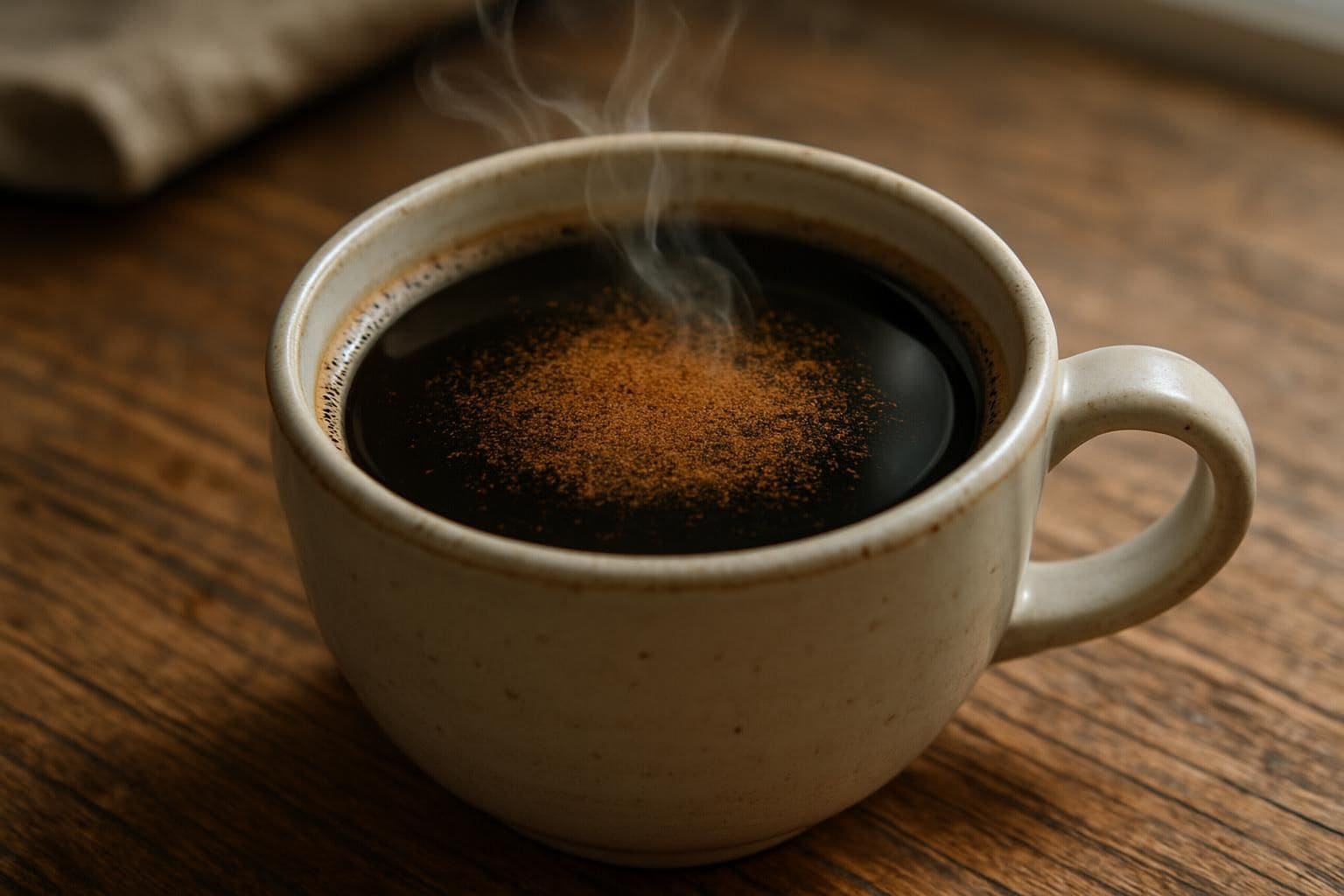
Unlike regular black coffee, flavored coffee can be tricky during fasting. Those tempting vanilla or hazelnut choices often sneak in hidden calories that mess up your fast. Most flavored coffee beverages contain syrup, cream, or sugar—which spike blood sugar levels and cause insulin release.
These reactions push against key benefits of intermittent fasting, like fat burning and better metabolic health.
What you put in your coffee matters more than the coffee itself.
Store-bought flavored grounds might look harmless, but they usually come with artificial sweeteners that disrupt fasting perks. Craving flavor without fasting issues is doable—try natural, zero-calorie seasonings such as Ceylon cinnamon or pure vanilla powder.
These options provide extra taste without breaking your fast. Guys who follow strict fasts should keep coffee simple or choose additives that support fasting goals, weight loss, and overall health.
Coffee with Milk or Cream

Flavored coffee often hides sneaky sugars, but dairy presents other fasting issues. Milk and cream raise your coffee’s calorie count, prompting your body to release insulin. This insulin reaction pulls your body out of fasting mode, since it now has nutrients to manage.
For guys using intermittent fasting to drop pounds, there’s a minor workaround—a splash of unsweetened heavy cream. Its carb content stays extremely low, so it probably won’t disrupt your fast entirely.
Cream’s fat digest slowly, causing little change in blood sugar levels.
Most fasting experts still recommend sticking with black coffee to fully preserve fasting’s benefits. If black coffee feels unbearable, try slowly cutting down your dairy portions a bit each day.
Gradually, your taste buds adapt, and plain coffee starts tasting better—or even good. Plenty of men find their appetite for sweet or creamy coffee naturally fading, usually within a few weeks of starting intermittent fasting.
Their tastes change as their bodies adjust to this new eating rhythm.
Coffee with Sugar

Sugar in coffee quickly ends your fast—it’s really that simple. Every spoonful you stir into your morning brew adds carbs and calories, causing blood sugar levels to jump. Rising blood sugar pushes against the main reason you break a fast in the first place.
Many guys overlook the hidden sugars hiding in popular coffee drinks. A common flavored latte often has anywhere from 20 to 30 grams of sugar—far more than you might spoon into your cup at home—cutting fasting short right away.
Sugar immediately stops fat burning and cancels out your fasting goals. Your body quickly switches from using stored fat to burning fresh sugar instead. This switch prevents key fasting benefits like better insulin sensitivity and less belly fat.
To manage your body weight effectively, stick to black coffee during your fasting window.
Benefits of Drinking Coffee While Fasting
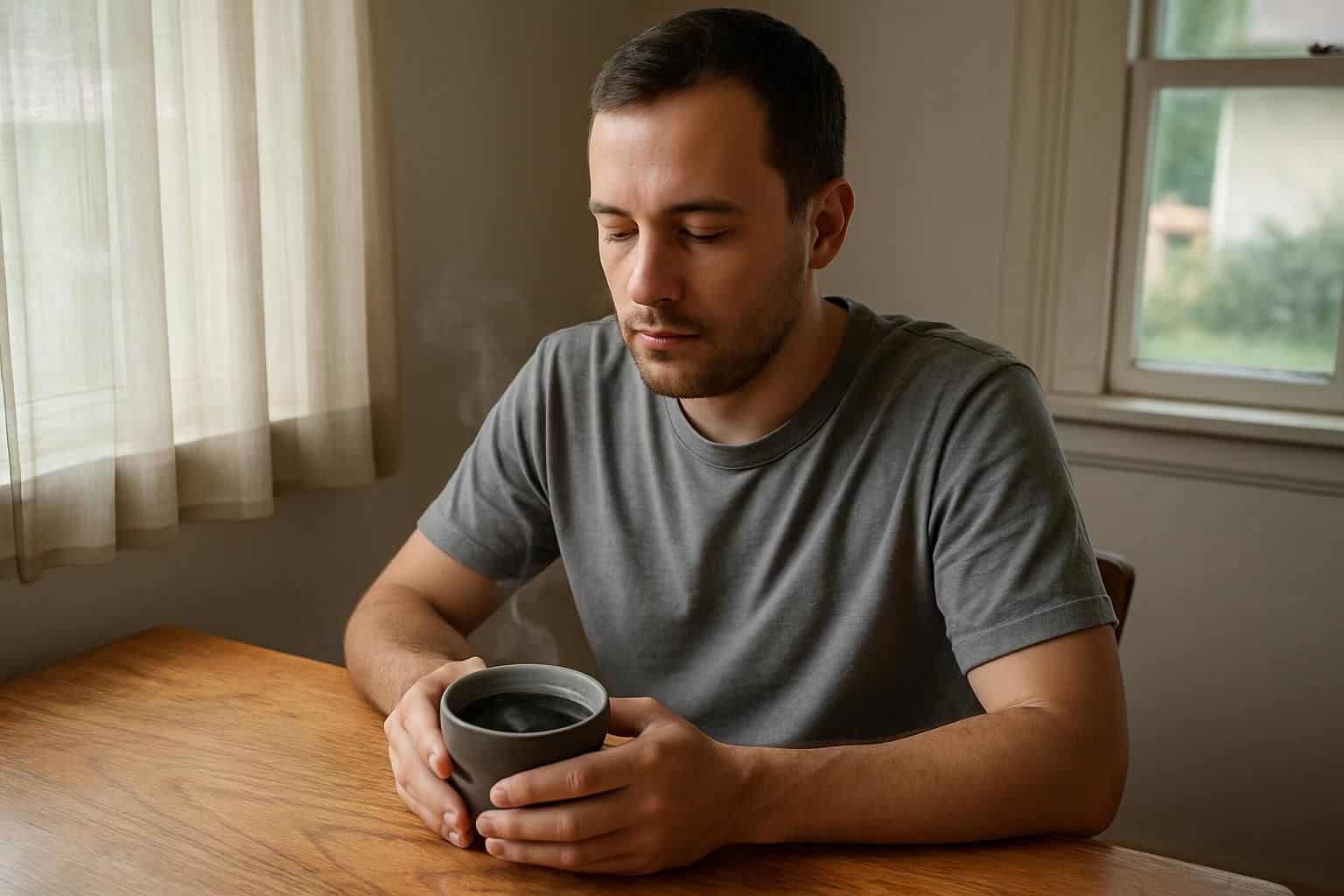
Coffee offers major perks for guys who fast beyond just a morning pick-me-up. Your cup of black coffee can boost fat burning while keeping hunger at bay during those tough fasting hours.
Appetite Suppression
Drinking black coffee can naturally ease hunger during fasting. Caffeine sends signals to your brain, helping you feel full and reducing cravings. Many men find their hunger stays low for hours afterward, making it simpler to maintain their fasting routine.
This happens because caffeine affects key hormones linked with hunger control.
A cup of black coffee is like having a secret weapon against hunger pangs during your fast.
Your body reacts to coffee by releasing peptide YY—a hormone known to increase feelings of fullness. For optimal results, skip any sugar or creamer—they can cause insulin to spike, undoing the benefit.
Even artificial sweeteners may backfire because they disturb healthy gut bacteria, potentially raising hunger later on. Drinking plenty of water along with your coffee strengthens coffee’s hunger-blocking effect—helping you smoothly manage your fasting periods without constantly thinking about food.
Increased Fat Burning
Coffee seriously boosts your body’s fat-burning power during fasting. Caffeine raises adrenaline levels, signaling your body to break down fat cells for energy. I’ve noticed this myself—my morning cup of black coffee helps me push through workouts, even on an empty stomach.
Recent studies support this idea, showing caffeine speeds up fat burning and also prevents new fat storage. This benefit works best with plain black coffee, since it has zero calories and won’t bump insulin or break your fast.
A lot of guys overlook coffee’s ability to fight obesity risks. Coffee’s natural compounds help improve metabolism and target tough belly fat. For optimal results, stick to moderate amounts, about one or two cups, during your fasting hours.
Too much caffeine can increase cortisol, messing up sleep and hurting your weight-loss efforts. Plain black coffee works perfectly—just skip sugar and cream, as they stop these helpful fat-burning effects.
Enhanced Energy and Focus
Drinking black coffee during a fast can sharpen your mind, especially on busy mornings. Many men feel more focused and clear-headed after enjoying their morning brew without eating first.
Without food in your stomach, caffeine kicks in quicker and offers longer-lasting alertness. I’ve experienced it myself—just one cup on an empty stomach wipes away that early-morning brain fog.
This mental boost happens because caffeine blocks a chemical called adenosine, which normally signals your body that you’re tired. Fasting also encourages your body to burn fat for energy, creating steady brain fuel throughout the morning.
Together, these effects help you stay energized and focused, without the sugar or cream crash you might otherwise get. Handling meetings and workouts becomes easier, making your morning routine simpler and more productive.
Improved Metabolic Health
Coffee can be a great boost to your metabolic health during fasting—especially black coffee. It keeps blood sugar stable, preventing sudden rises in insulin. This is crucial for guys who want to steer clear of type 2 diabetes or metabolic syndrome.
I’ve found my own energy feels steadier all day if I drink black coffee during my fast. Plus, coffee is loaded with antioxidants. These helpful compounds lower inflammation in your body and make energy processing smoother, cell by cell.
A good cup of coffee also kicks up your body’s fat-burning power, helping to trim stubborn belly fat. Many men notice clearer results with intermittent fasting by simply adding black coffee to their daily routine.
Your body learns to use stored fat more effectively for fuel, instead of always craving carbs. Thankfully, coffee’s caffeine content supports fat burning without breaking your fast.
Just make sure you skip cream and sugar—the extras ruin the perks. By having your coffee black, your metabolism stays strong, and your body stays firmly in the fasting zone needed for lasting health perks.
Drawbacks of Drinking Coffee While Fasting
Coffee during fasts comes with some downsides like sleep problems, stomach issues, stress hormone spikes, and changes to your body’s cell cleanup process – read on to learn how to avoid these pitfalls while still getting your caffeine fix.
Potential Sleep Disruptions
Drinking coffee during fasting can seriously mess with sleep. That late-afternoon cup might sound good, but you’ll probably regret it at bedtime. Experts recommend cutting out caffeine at least nine hours before you plan to sleep, just to be safe.
Black coffee boosts stomach acid too, so you might experience discomfort that makes falling asleep even harder. Even one quick espresso after lunch has had me wide awake, staring at the ceiling past midnight.
The quality of your sleep affects everything from your weight loss goals to your mental clarity during a fast.
How caffeine affects you depends heavily on personal tolerance levels. Some people can have iced coffee at 4 PM and sleep perfectly fine, while others need to stop drinking anything caffeinated by noon.
Acid reflux from coffee on an empty stomach can also leave you restless and uncomfortable at night. Mixing MCT oil or grass-fed butter into your drink worsens this reaction—the added fats alter how your body absorbs caffeine, making its effects last even longer.
Digestive Issues
Coffee on an empty stomach during a fast can hit you pretty hard. It prompts your body to produce extra stomach acid—which isn’t great if you have a sensitive gut or deal with IBS.
Many people notice issues like heartburn or acid reflux after their first morning cup. I’ve felt this too—a burning sensation right in my chest after sipping black coffee without eating.
Coffee’s natural acidity often triggers those uncomfortable feelings, especially without food to soften its impact. Plus, that morning cup can speed up your digestive system, causing loose stools or even diarrhea that messes up your routine.
Everyone’s gut reacts differently to coffee. Some guys handle three cups during fasting periods without a hitch. Others experience stomach cramps or discomfort after just a few sips.
Research indicates coffee may cause a temporary spike in blood sugar levels during fasting, which can alter your overall results. If these stomach issues keep bugging you, consider cutting coffee during fasting windows.
Or test out some cold brew—the brewing method makes it less acidic, making it gentler and easier on your stomach.
Heightened Cortisol Levels
Drinking your morning joe during fasting can raise stress hormones in your body. Caffeine on an empty stomach pushes cortisol levels higher. I learned this myself—after a month of fasting with black coffee, I felt jittery and tense more often.
Your body sees caffeine as a mild stress trigger. For guys aiming to shed belly fat, this can become an issue. Elevated cortisol encourages the body to store fat and can disrupt restful sleep.
Timing your coffee intake also makes a difference. A morning dose of caffeine raises cortisol more than an afternoon cup does. This shift impacts how well your body absorbs nutrients later.
Many men benefit from waiting until after 10 a.m. for their first cup, giving natural cortisol levels time to settle down. You could also consider reducing your intake—from three cups a day to just one.
It’s about moderation—enjoy coffee during fasting, but stay alert to anxiety or stomach upset, clear signals that your cortisol may be getting too high.
Impact on Autophagy
Coffee can affect your body’s natural cleanup system during fasting. This process—known as autophagy—cleans out damaged cell parts and keeps diseases away. Pure black coffee won’t spike your blood sugar much, but adding butter or coconut oil can slow down this important cleanup.
Your body counts on autophagy to maintain good health, making the cleanup vital. Most guys underestimate how much caffeine timing matters. Sipping coffee late in the day can mess up your sleep, weakening autophagy even more.
What you add to your morning coffee matters greatly for actual fasting benefits. Studies show autophagy works best on calorie-free fasts. MCT oil or grass-fed butter might be okay for dropping pounds but will likely block deeper cell repair.
Men focused on metabolic benefits and cellular healing get better results from sticking to plain black coffee.
Coffee Additives and Their Effects on Fasting
What you add to your coffee can make or break your fast. Some additives spike insulin while others keep fat-burning going strong.
MCT Oil, Butter, or Coconut Oil
Lots of men on fasting regimens put fats like MCT oil, grass-fed butter, or coconut oil into their morning coffee. This mix, usually called bulletproof coffee, fits nicely into fasting routines paired with a keto diet.
These healthy fats don’t raise insulin much, meaning your fast stays on track. Medium-chain fats, found in MCT and coconut oils, increase ketone levels—helping your body burn fat more effectively during fasting.
A big plus for guys is smooth and steady energy, unlike the sharp crash black coffee alone sometimes causes. Dave Asprey, who popularized bulletproof coffee, suggests these healthy fats sharpen your mental clarity during a fast.
Start small, though—one tablespoon of butter or MCT oil works fine. Too much fat at once might upset your stomach or cause diarrhea, especially if you haven’t eaten yet. Now, let’s see how artificial sweeteners could influence your fasting results….
Artificial Sweeteners
Artificial sweeteners like aspartame and Splenda may appear ideal as zero-calorie choices for fasting—but they carry hidden downsides. These sugar alternatives can fool your body into releasing insulin, undoing fasting’s core advantages.
Your brain receives a sweet signal, expecting sugar that doesn’t show up, leading to hunger pangs and intensified cravings. Some men even find artificial sweeteners raise appetite instead of calming it down.
Natural sweeteners like stevia and monk fruit can work better in tiny amounts if you want coffee with a hint of sweetness. These plant-based options have a smaller impact on blood sugar levels compared to artificial versions.
Yet, for the cleanest fast and maximum rest for your gut, it’s better to skip sweeteners altogether. Black coffee may taste bitter initially—but your palate quickly adjusts within one or two weeks.
Next, let’s consider how MCT oil and other fats influence your body during fasting.
Unsweetened Almond or Nut Milk
Now, let’s move past artificial sweeteners and chat about another popular coffee addition—unsweetened nut milks. Unsweetened almond milk might sound like a good choice for fasting, but be cautious.
Even though it beats regular milk, it still brings calories that could break your fast. Adding a small splash in your coffee packs around 5 to 10 calories. That seems minor, but those calories add up fast after multiple cups.
Personally, I find just a tiny bit helps me enjoy coffee without triggering hunger later on.
If maintaining a strict fasting schedule is your goal, sticking to black coffee is ideal. Almond milk offers fewer carbs than regular dairy milk, yet those calories still matter. Many folks overlook that even small portions of nut milk raise insulin levels—which pauses fat burning.
If you absolutely need something in your coffee, stick to one tablespoon of almond milk per cup—and only in the morning. Your fasting will stay on track more easily this way.
Tips for Drinking Coffee While Fasting

These smart tips can help you enjoy coffee during your fast without breaking it – learn the right way to drink your cup of joe, what to avoid, and how to time your caffeine for the best results.
Drink It Black When Possible
Black coffee makes the perfect partner during fasting hours. Every morning, I drink mine plain—no extras—to keep my fast going strong. With almost no calories, black coffee doesn’t raise your blood sugar or insulin level.
That’s important, because cream, sugar, and flavored syrups all add calories, breaking the fast as your body works to digest the extras. A lot of guys use black coffee to squash hunger pangs during their fast; it makes sticking to intermittent fasting a whole lot easier.
If plain coffee feels tough to enjoy, spruce it up without breaking the fast. Add a little cinnamon or nutmeg for tasty flavor without calories. Some people enjoy a tiny bit of monk fruit sweetener, too—a natural, calorie-free option.
The main bonus stays the same: black coffee helps burn fat while keeping your energy and focus sharp. Just don’t rely on coffee alone to keep you hydrated—drink plenty of water throughout the fasting period, too.
Avoid Adding Sugar or Cream
Sugar and cream are two things you’ll want to avoid during your fasting window. Just one spoonful of sugar adds calories, spikes blood sugar, and stops your fasting benefits right away.
Regular cream contains fat and protein, which raise insulin levels and halt your body’s fat-burning mode during fasts. Many men overlook how even tiny amounts of these additives can throw off their fasting progress and weight-loss plans entirely.
Your best option remains plain coffee—with under 5 calories per cup. If plain coffee seems a bit harsh, try seasoning it lightly with cinnamon or nutmeg. These spices offer flavor without adding calories or spiking insulin.
Some guys prefer lighter roasts, finding them smoother and easier to drink during fasts. Artificial sweeteners aren’t your friend either—they can fool your body into releasing insulin, even though you’re not consuming actual sugar.
Next, we’ll talk about staying hydrated and how it helps your fasting routine.
Limit Consumption to Morning Hours
Coffee pairs perfectly with a morning fast. Your body processes caffeine more efficiently earlier in the day—most men fully clear it within five to seven hours. Personally, I enjoy black coffee by 10 AM to dodge sleep issues later.
Consuming caffeine after noon disrupts sleep patterns and raises cortisol levels, exactly when they should fall. This simple timing trick boosts fat-burning benefits during intermittent fasting and keeps your energy stable.
Late-afternoon coffee drinking quietly sabotages your sleep, even if you think you’re unaffected. Many men assume they can tolerate caffeine later on, yet it often means restless sleep and midnight bathroom visits.
Drinking coffee in the morning supports your body’s natural cortisol cycles, further aiding your metabolic health. To preserve your fasting window without caffeine drawbacks, stick with water or herbal tea in the afternoon.
Stay Hydrated
Staying hydrated is your best ally during a fast. Sure, black coffee can ease hunger—but it won’t cover your body’s full hydration needs. You still need plenty of water to flush out toxins and keep everything running smoothly.
So, along with your daily coffee, try drinking at least 8 to 10 cups of water. Many guys rely too much on coffee in their fasting window, and this often leads to headaches and feeling dehydrated.
Zero-calorie electrolyte drinks can also help you stay well-hydrated without disrupting your fast. These beverages support fluid balance and are especially helpful if you work out while fasting.
Plain water usually does the trick, but a tiny bit of salt can replenish essential minerals during longer fasting periods. Your body naturally loses minerals while fasting, and proper hydration is key to preventing fatigue and muscle cramps.
What Else Can You Drink While Fasting?
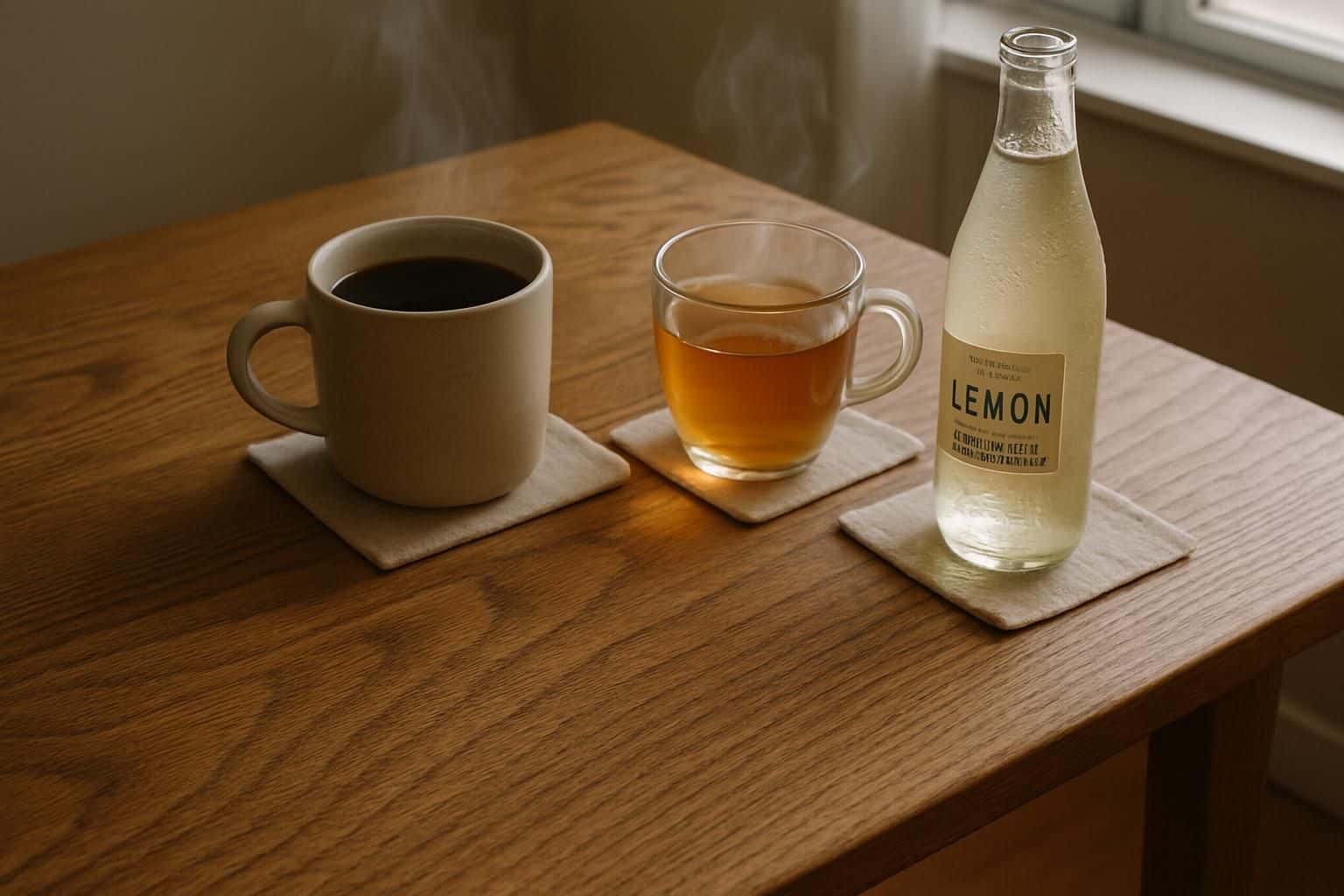
Fasting doesn’t mean you must stick to plain water. You can enjoy several other drinks that won’t break your fast or mess with your results.
The output for the above instruction are:
Fasting doesn’t mean you must stick to plain water. You can enjoy several other drinks that won’t break your fast or mess with your results.
Herbal Tea
Herbal tea makes a perfect choice for men who fast regularly. These plant-based drinks contain virtually zero calories, letting you enjoy them without worry. A lot of my friends rotate between black coffee and herbal teas like peppermint or chamomile to stay hydrated during their fasting periods.
These beverages won’t boost your insulin levels, so your fast stays on track. Just drink them plain—no honey, sugar, or milk—to keep all the fasting benefits intact.
Hydrating properly makes a big difference during a fasting window. Even without solid food, your body still needs plenty of fluids. Herbal teas help fulfill that need while giving your taste buds some variety.
I’ve personally noticed that mixing water and unsweetened teas reduces hunger cravings better than drinking only plain water. Having options keeps fasting interesting, especially during longer stretches.
Now, let’s consider other fasting-friendly drink choices.
Water
Water is your top buddy during fasting phases—it has zero calories, so it keeps your fast intact. A lot of folks neglect hydration, but staying hydrated helps reduce those pesky hunger cravings.
Keeping yourself hydrated helps your body burn fat better, and it also supports basic bodily functions while you’re fasting.
Drinking water serves double purposes: it fills your stomach to ease hunger, and it helps your metabolism stay active. To prevent headaches and tiredness, aim for eight glasses of water each day during fasting hours.
Proper hydration is even more essential if you’re drinking coffee while fasting, since caffeine often leads to mild drying effects. Next, we can check out other zero-calorie options you might enjoy during your fasting hours.
Electrolyte Drinks (Zero-Calorie)
If you’re fasting, plain water isn’t your only choice—zero-calorie electrolyte drinks can really help. These types of drinks replenish important minerals your body loses through regular activity and sweating, all without interrupting your fasting routine.
Lots of good brands now offer sugar-free electrolyte mixes, specifically created for active men who fast.
I’ve tried several of these electrolyte products during my own 16-hour fasting windows and felt fewer headaches and muscle cramps. Always check the labels, and choose drinks with sodium, potassium, and magnesium—without sneaky sugars or calories added in.
Electrolyte drinks like these can boost metabolism and maintain steady insulin levels, too. Blend with some ice cubes for a cool drink that’s tasty, refreshing, and completely fasting-friendly.
How Will Drinking Coffee While Fasting Evolve in 2025?
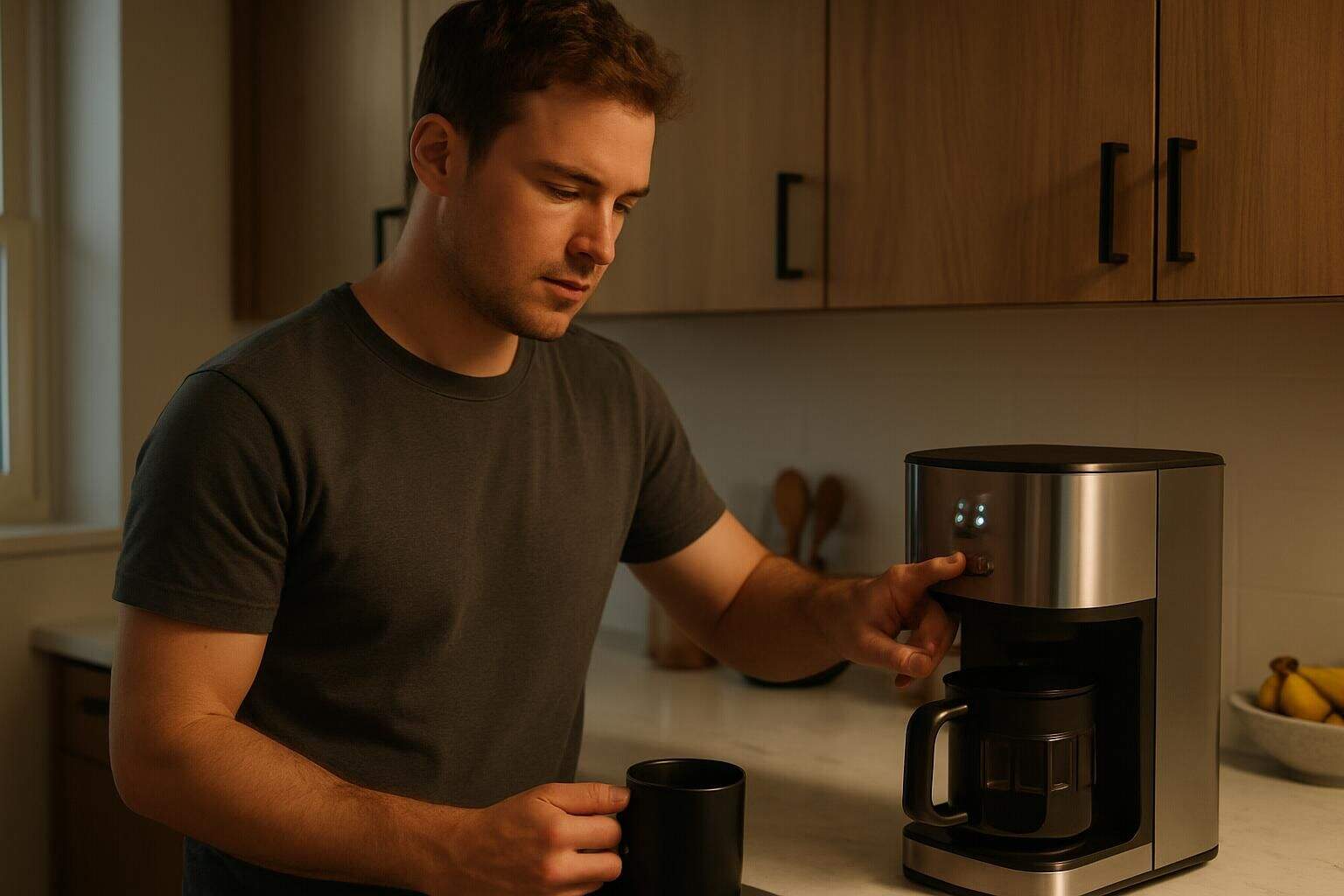
Big changes for coffee and fasting are set for 2025. Soon, smart coffee machines will know your fasting schedule and brew the ideal black coffee—matched exactly to your caffeine needs.
Special MCT oil products will appear, designed specifically for fasts, helping men trim stubborn belly fat and maintain steady insulin levels.
Coffee companies plan to roll out fasting-friendly selections, using zero-calorie monk fruit sweetener already blended in. I sampled one of these new blends last month—it amazed me how energized I felt, all without disrupting my fast.
New apps will link up directly with blood sugar monitors, advising the ideal moment to sip your coffee during time-restricted eating. Tools like these will make coffee even more effective for boosting metabolism and managing your weight.
People Also Ask
Can I drink black coffee during intermittent fasting?
Absolutely, black coffee is totally fine during fasting periods. It barely has calories, so it won’t interrupt your fast. Plus, many folks find it useful to curb hunger cravings in fasting hours.
Will adding cream or sugar to my coffee break my fast?
Mixing cream, sugar, or even milk into your coffee will end your fasting period. These extras add calories and trigger insulin production. If you want to remain in a fasted state, drink your coffee black—plain and simple.
What about bulletproof coffee with MCT oil and grass-fed butter?
Bulletproof coffee—with ingredients like MCT oil and grass-fed butter—does contain calories, breaking your fast. Still, certain fasting styles approve it, because healthy fats don’t raise blood sugar levels as much as sugar or carbs do. Check with a registered dietitian to see how it matches up with your specific fasting targets.
Are zero-calorie sweeteners okay in coffee while fasting?
Experts still aren’t completely clear about zero-calorie sweeteners, like monk fruit, during fasting periods. Some research indicates they might still cause insulin spikes despite their zero-calorie claims. To stay on the safe side, you might want to skip these sweeteners during fasting windows.
How does coffee affect weight loss during intermittent fasting?
Coffee is helpful for weight loss while doing intermittent fasting. Caffeine can speed up your metabolism and target abdominal fat specifically—helping you manage your weight a little easier. Plus, drinking coffee naturally reduces hunger, making your fasting more manageable.
Can drinking coffee while fasting cause digestive issues?
Drinking coffee on an empty stomach can sometimes lead to indigestion, stomach upset, or changes in bowel movements. Coffee contains acids that could irritate your stomach lining. If this happens to you, switch to a cold brew—it has less acid—or just cut back on how much you drink.

